DIY Furniture Plans – A Simple Rustic Dresser with Built-In Handles on the Drawers
This dresser is truly the simplest… The DIY plans to build a Mayweather Dresser feature nine drawers (three narrow and six larger) with built-in handles consisting of a 1×2 sandwiched between two boards. The entire dresser sits on supports with a kickplate at the front. This is a project that can be completed over a weekend!

Materials:
- 1-1/4″ pocket hole screws (<– affiliate link!)
- 1-1/4″ brad nails
- 1-1/4″ screws
- Edge banding
- 9 sets of 20″ drawer slides (eBay is a great source!)
- Wood glue
- Sandpaper (100, 150, 220 grits)
- Finishing supplies (primer & paint, or stain, sealer)
Lumber:
- 4 – 1×2 at 8′
- 6 – 1×6 at 8′
- 2 – 4′ x 8′ sheet of 1/4″ plywood
- 3 – 4′ x 8′ sheets of 3/4″ plywood
Cut List:
- 2 – 3/4″ plywood at 21-1/4″ x 27-3/4″ – Sides
- 1 – 3/4″ plywood at 21-1/4″ x 63-1/2″ – Bottom
- 2 – 3/4″ plywood at 21-1/4″ x 27″ – Dividers
- 1 – 3/4″ plywood at 21-1/4″ x 65″ – Top
- 4 – 1×2 at 22″ – Front Stretchers
- 2 – 1×2 at 18″ – Front Stretchers
- 1 – 1/4″ plywood at 27-11/16″ x 64-1/4″ – Back
- 4 – 1×6 (ripped to 4″ wide) at 18-1/2″ – Bottom Supports
- 1 – 1×6 (ripped to 4″ wide) at 63-1/2″ – Kickplate
- 12 – 3/4″ plywood at 7″ x 19-1/2″ – Larger Drawer Box Front & Back
- 12 – 3/4″ plywood at 7″ x 20″ – Drawer Box Sides
- 6 – 1×4″ plywood at 19″ x 20-1/8″ – Larger Drawer Box Bottom
- 6 – 3/4″ plywood at 7″ x 15-1/2″ – Narrower Drawer Box Front & Back
- 6 – 3/4″ plywood at 7″ x 20″ – Drawer Box Sides
- 3 – 1×4″ plywood at 16-1/8″ x 19″ – Narrower Drawer Box Bottom
- 6 – 1×2 at 23″ – Larger Drawer Front Center
- 12 – 1×6 (ripped to 4-5/16″ wide) at 23″ – Larger Drawer Front
- 3 – 1×2 at 18-3/4″ – Narrower Drawer Front Center
- 6 – 1×6 (ripped to 4-5/16″ wide) at 18-3/4″ – Narrower Drawer Front
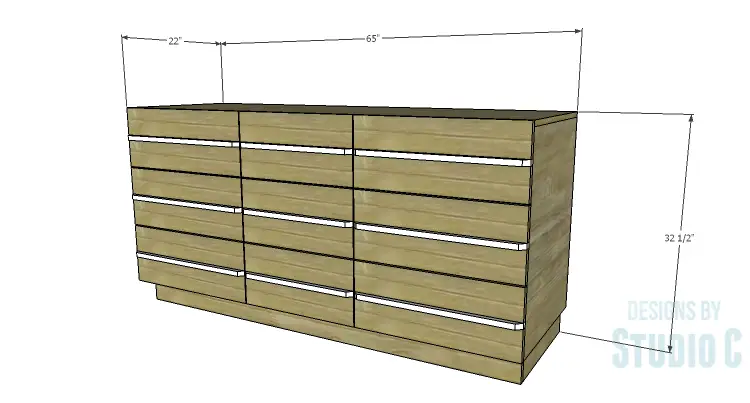
Edge banding will be applied to the exposed edges of the plywood prior to assembly.
Step One
Cut the pieces for the sides and the bottom. With the pocket hole jig set for 3/4″ material, drill pocket holes in each end of the bottom piece as well as the top edges of the sides. Secure the bottom to the sides using glue and 1-1/4″ pocket hole screws.
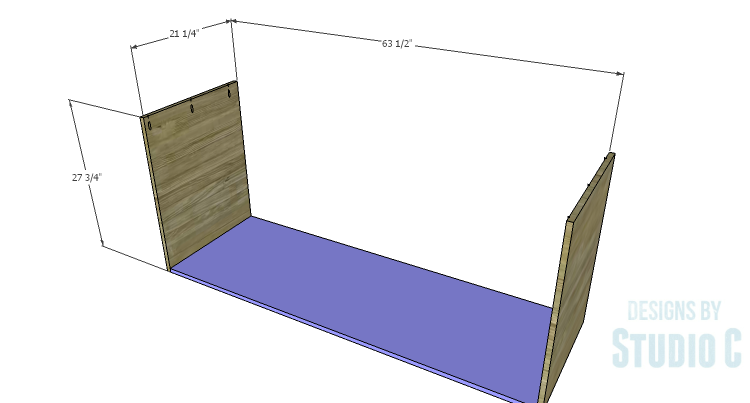
Step Two
Cut the pieces for the dividers and drill pocket holes in the top and bottom edges. Secure the dividers to the bottom using glue and 1-1/4″ pocket hole screws.
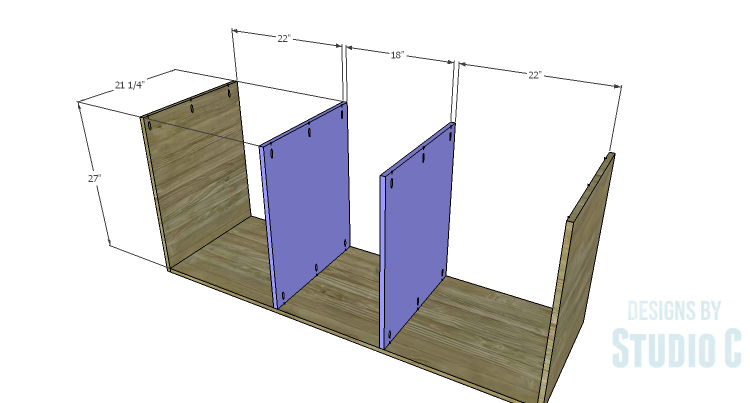
Step Three
Cut the piece for the top. Secure the top using glue and 1-1/4″ pocket hole screws through the pocket holes in the top edges of the sides and dividers.
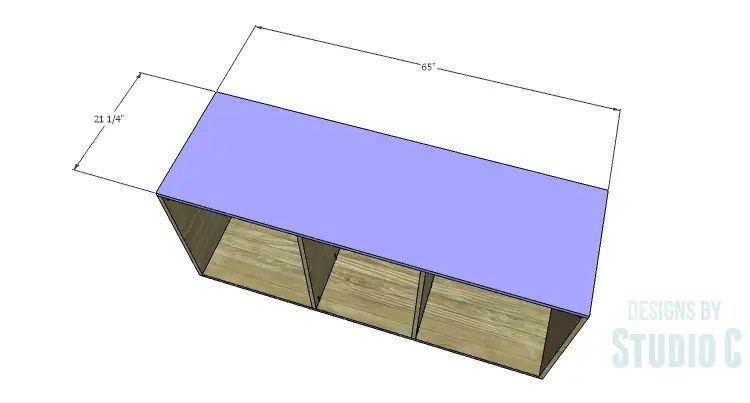
Step Four
Cut the pieces for the front stretchers and drill pocket holes in each end of the longer pieces. Secure the shorter center pieces first, using glue and 1-1/4″ brad nails, then secure the longer pieces using glue and 1-1/4″ pocket hole screws. This way, the screws won’t interfere with each other!

Step Five
Cut the piece for the bottom supports and drill pocket holes along one long edge. Secure the supports to the underside of the bottom using glue and 1-1/4″ pocket hole screws.
Cut the piece for the kickplate. Secure the kickplate to the front of the bottom supports using glue and 1-1/4″ brad nails.
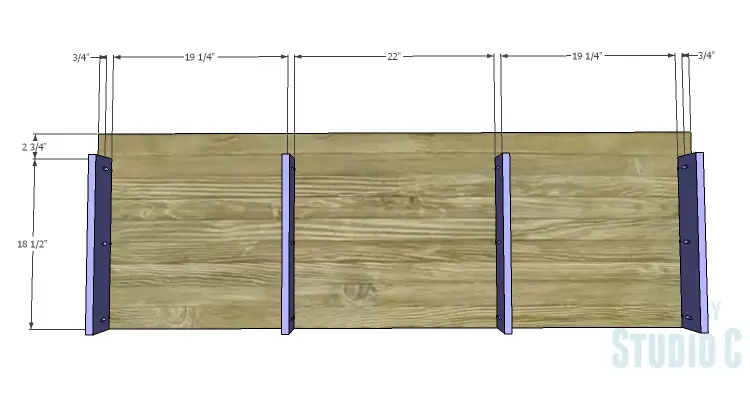
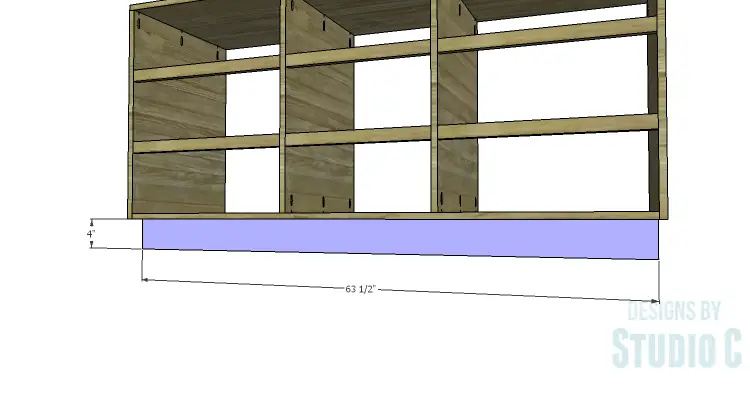
Step Six
Cut the piece for the back. Secure the back using glue and 1-1/4″ brad nails.
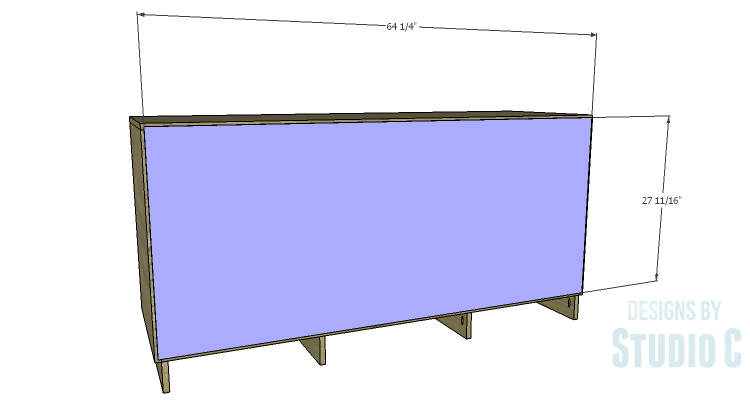
Step Seven
Cut the pieces for the drawer box sides, front, and back. Cut the groove in the bottom edge of each piece at 1/4″ wide by 3/8″ deep using a table saw or a router and a straight bit. Set the pocket hole jig for 3/4″ material and drill pocket holes in each end of the drawer box sides on the opposite side as the groove. Make sure that the pocket holes will not interfere with the groove. Secure the sides to the back using glue and 1-1/4″ pocket hole screws.
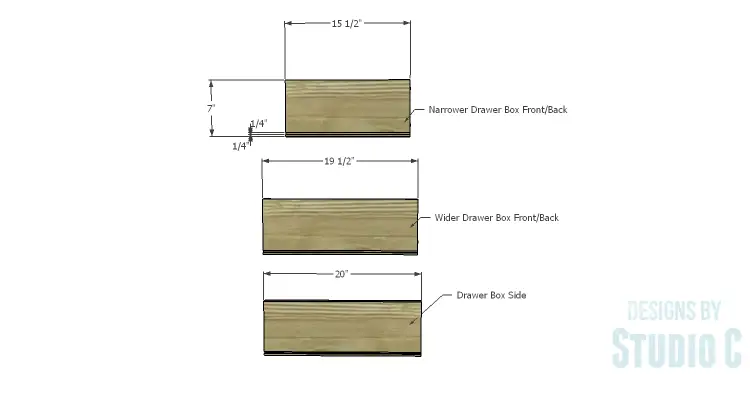
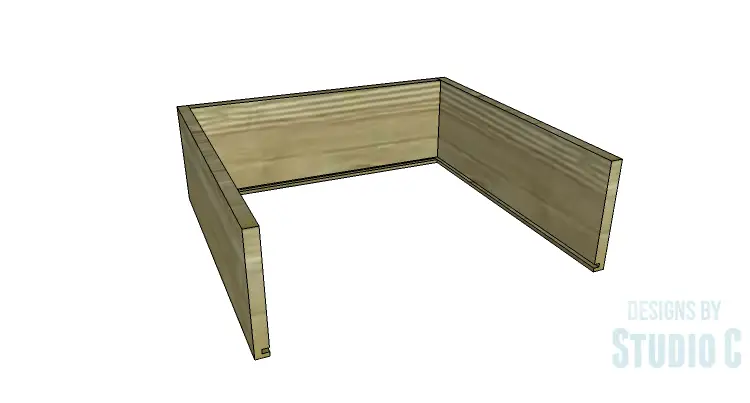
Step Eight
Cut the piece for the drawer bottom. Slide the bottom into the grooves in the sides and back. The piece should fit snugly but not too tight.
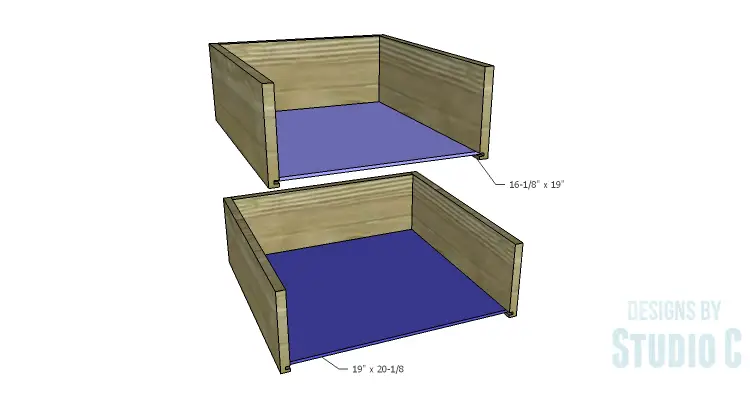
Step Nine
Insert the front edge of the drawer box bottom into the groove on the drawer box front. Secure the drawer box sides to the drawer box front using glue and 1-1/4″ pocket hole screws.
Install the drawer slides according to the manufacturer’s instructions, locating them flush with the front edge of the sides and dividers.
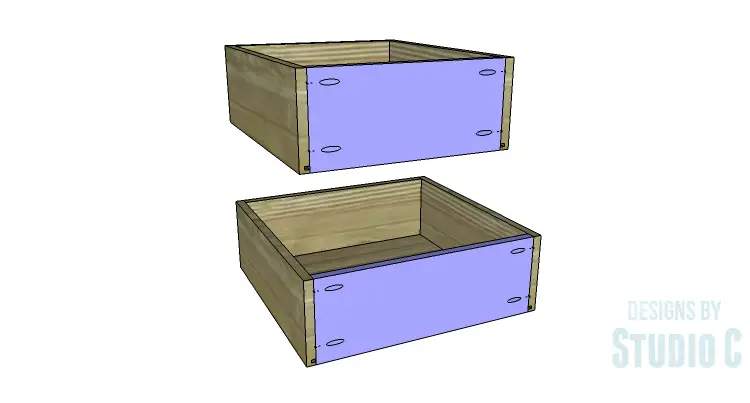
Step Ten
Cut the pieces for the drawer fronts. Cut the 1×2 handles to length, then cut 45° bevels in the edges as shown in the drawing.
Drill pocket holes along one long edge of each drawer front piece, staggering the pocket holes so they won’t interfere with each other. Sandwich the 1×2 between the wider pieces using glue and 1-1/4″ pocket hole screws.
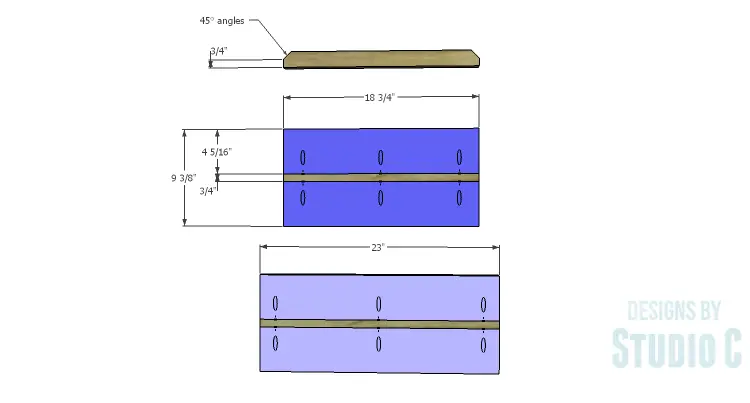
Step Eleven
The sides of the longer drawer fronts will be flush with the outside of the cabinet. The top edge of the uppermost drawer fronts will be flush with the top, and the bottom edge of the lower drawer fronts will be flush with the bottom. Secure each drawer front to the corresponding drawer box using glue and 1-1/4″ brad nails. Open the drawers, then secure the fronts from the inside using 1-1/4″ screws.
The remaining drawer fronts will be spaced as indicated in the drawing.
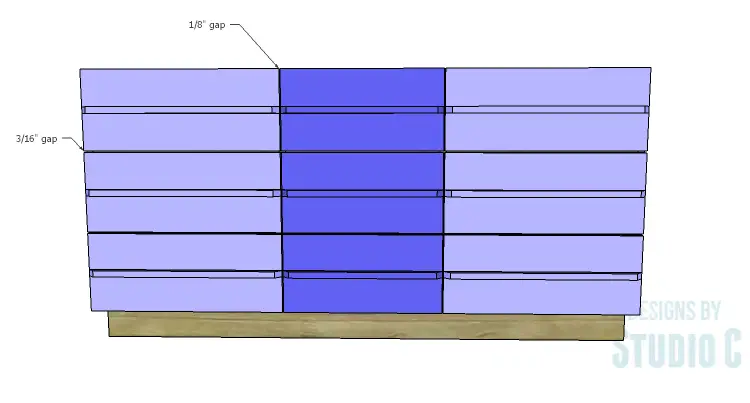
Finish as desired.
The style of this fabulous dresser would look great in any room, and can also serve other uses – as a media stand, as storage in an entryway, or as storage in a dining room. Have any questions about the DIY plans to build a Mayweather Dresser? Leave a comment below!
Originally posted 2015-09-01 08:00:56.

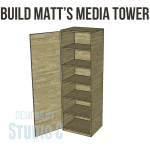
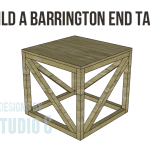
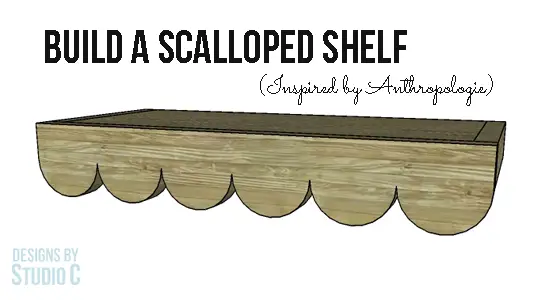
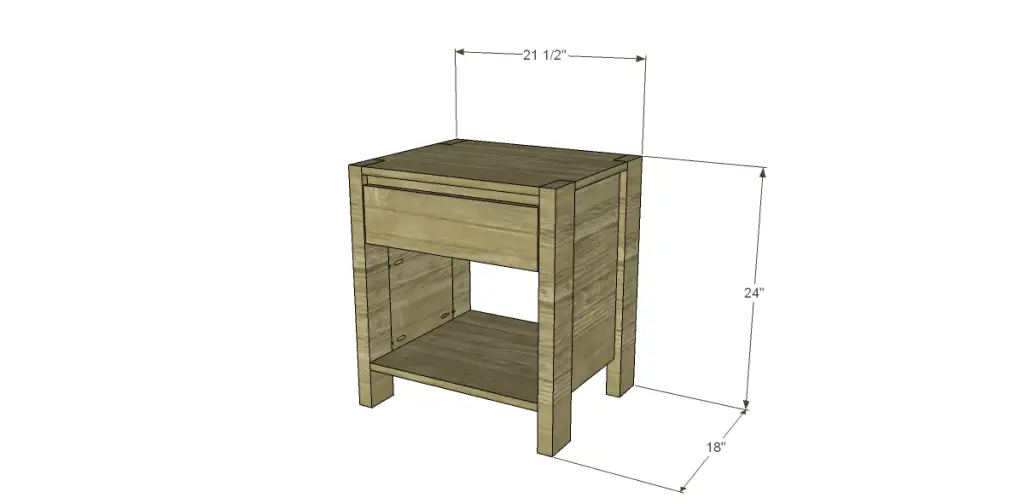
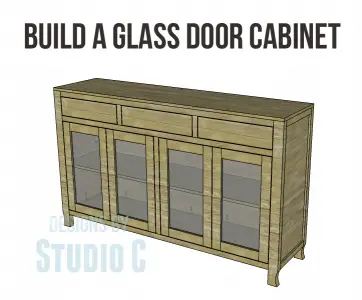
Comments are closed.